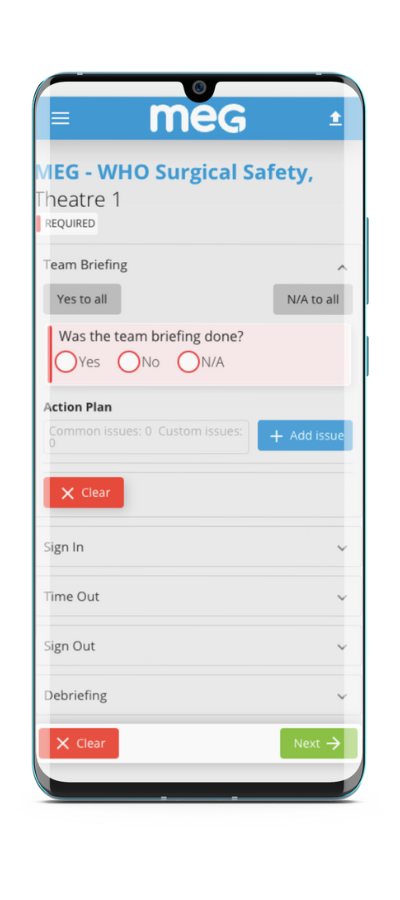Since its inception in 2008, there has been an abundance of good quality evidence highlighting the benefits of the WHO’s Surgical Safety Checklist (SSC) in terms of improved surgical mortality and morbidity globally.
Despite this, however, challenges have been experienced in the correct and consistent implementation of the SSC.
Studies involving prospective observational audits (Giles et al.) highlight low completion rates and that compliance data collected in observations can differ significantly from reported compliance in medical records.
Therefore, if relying solely on a retrospective review of medical records, a hospital would be unlikely to detect poor adherence to the checklist, and the impetus for improvement would not exist.
This discrepancy between what happened and what was recorded may impact upon patient care.
Going Digital for improved patient safety and productivity
MEG’s SSC Audit was designed to support hospitals who want to carry out more observational SSC audits in the interest of quality assurance and improved patient safety.
The digital audit is optimised for mobile but also available for use on any device (including desktop), even in poor connectivity.
Benefits of MEG’s digital Surgical Safety Checklist audit:
Observational audit data can be conveniently captured on a device at the point of care
Questions sets, workflows and reports are fully configurable to an organisation’s requirements
Instant reports are available for data-driven feedback to staff, a technique proven to reinforce behavioural change
Organisation-wide results across are collated in MEG for analysis, benchmarking, and displayed on configurable ‘Insights’ dashboards to understand and prioritise areas of risk
Action/quality improvement plans to mitigate risk can also be managed in MEG - with assigned ‘Actions’, task management, and comprehensive reporting on ‘Action Completion’ statuses available.
“MEG’s healthcare audit management systems provides an excellent opportunity for our healthcare
network to easily perform audits and deliver timely reporting and quality improvement plans. It will
enable us to demonstrate compliance with standards and we are excited at the possibilities of
introducing a range of audits with the system.”
example digital audit and corrective action workflow:
SSC Audit data is easily collected on any device from all over an organisation
Real-time reporting and data insights becomes a reality as information gathered is uploaded and displayed on live dashboards
Teams now have the relevant context and ability to engage staff in ‘closing-the-loop’, with automated digital workflows that mirror existing processes and email notifications/calendar reminders and much more!
Giles et al., ‘Use of surgical safety checklists in Australian operating theatres: an observational study’, ANZ Journal of Surgery 87 (2017) 971






